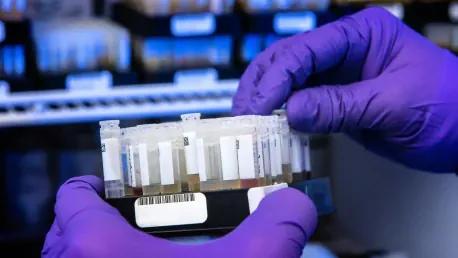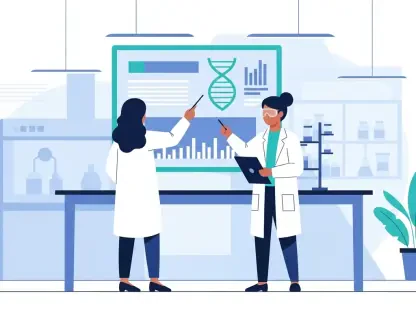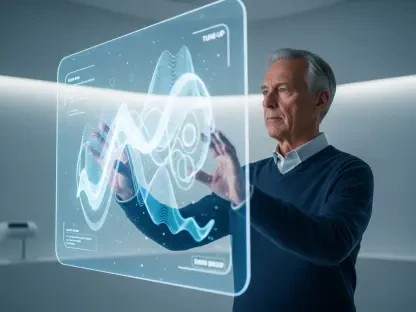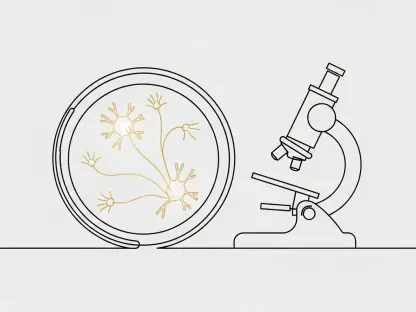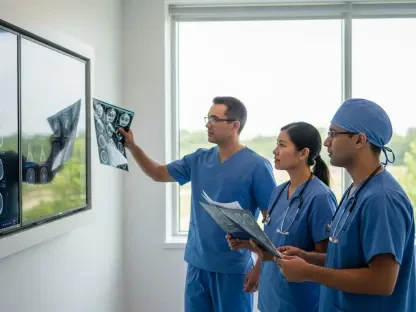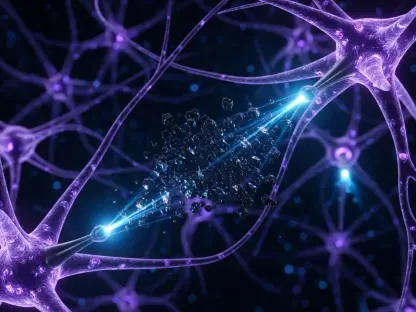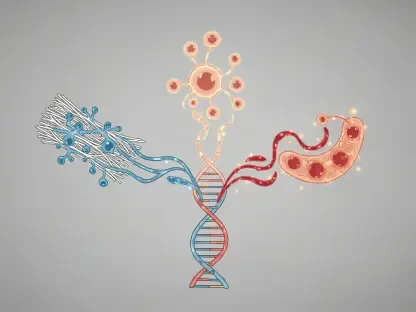Antibody development is integral to pushing the boundaries of research, diagnostics, and therapeutics. Characterized by their high specificity and affinity, antibodies are critical for detecting and neutralizing biological targets, leading to significant breakthroughs across various scientific fields. Bio-Rad Laboratories stands at the forefront of antibody development, utilizing advanced technologies and scientific expertise to address critical challenges in this domain. The company’s proprietary antibody services, such as HuCALTM PLATINUM and the PioneerTM Antibody Discovery Platform, highlight their continuous innovation. Notably, Pioneer offers one of the largest functional phage display libraries available for biotherapeutic discovery. This article details an in-depth conversation with Dr. Sophie Mayle, Dr. Paul Royle, and Dr. John Cardone from Bio-Rad, discussing recent advancements and future directions in antibody innovation.
Technological Advances Impacting Antibody Quality and Reliability
Technological advances are proving instrumental in enhancing antibody quality and reliability, ensuring they meet the demanding requirements of modern research and therapeutic applications. Dr. Paul Royle explains that Bio-Rad recently developed the Pioneer Antibody Discovery Platform, a state-of-the-art human antibody library based on phage display technology. This platform, built on over 20 years of expertise, swiftly generates diverse and high-affinity therapeutic leads with excellent developability profiles. Central to this platform is the Pioneer Antibody Library, one of the largest functional phage display libraries ever created. The antibody sequences within this library are meticulously curated to ensure compatibility with the phage display platform and account for downstream factors like developability while using limited, most developable germlines. This preemptive approach enhances overall quality and reliability, making the process more streamlined.
Dr. Sophie Mayle highlights another stride made by Bio-Rad with SpyTag and SpyCatcher technology, deemed “molecular superglue.” This innovation facilitates rapid antibody formatting at the protein level without necessitating subcloning. Embracing this technology, Bio-Rad has exploited it within the antibody field to meet varied format requirements for diverse applications. SpyTagged recombinant Fab antibodies can be combined with various SpyCatchers to create multiple antibody formats termed TrailBlazer Antibodies. This process ensures high batch-to-batch consistency, as site-specific labels in SpyCatchers do not interfere with antigen-binding regions, leading to reliable antibody batches. The ability to couple antibodies with SpyTags to different SpyCatcher proteins allows for rapid assembly of multiple stable products, including bivalent Fabs and Ig-like antibodies with distinct isotypes, augmenting assay design possibilities.
Custom Antibody Services Catering to Specific Research Needs
Bio-Rad offers extensive custom antibody services tailored to specific research pursuits, addressing the unique demands of various scientific fields. For generating drug candidates like therapeutic antibodies, the Pioneer platform is utilized, whereas the HuCAL library is employed for creating tool antibodies, including research antibodies, in vitro diagnostic (IVD) reagents, and antibodies for clinical trials. By utilizing antibody library screening strategies, custom antibodies meeting customer’s precise requirements are produced. Additionally, classical antibody cell culture techniques at their Oxford site facilitate large-scale (gram-level) production for IVD manufacturers. This level of customization ensures researchers receive antibodies perfectly suited to their needs, advancing scientific discovery and practical applications.
Bio-Rad also addresses the challenge of antigen quality by ensuring antibodies are generated against well-designed and robust reagents. Dr. Paul Royle underscores that the quality of generated antibodies hinges on the antigen’s proper conformation. They employ various strategies to overcome challenges posed by difficult-to-reproduce proteins, such as partnering with Salipro to maintain protein structures on nanodiscs and using whole cells displaying the target antigen. This ensures antibodies generated are functional in real-world applications. Furthermore, Bio-Rad’s in vitro phage display technology allows the development of antibodies for toxic products that are unsuitable for immunization-based techniques in animals, addressing both ethical concerns and practical challenges. This multifaceted approach guarantees that Bio-Rad remains at the cutting edge of antibody development.
Advances in Bi- and Multispecific Antibody Design and Production
Innovation in bi- and multispecific antibody design and production is revolutionizing therapeutic strategies. Bio-Rad leverages SpyTag and SpyCatcher technology, augmented by the novel SpyLock system, to advance the design and production of bi- or multi-specific antibodies. SpyLock, a modification of SpyCatcher, temporarily blocks SpyTag binding until a reducing agent removes the obstruction, enabling sequential, specific assembly of bi-specific heterodimers. This rapid, efficient, and cost-effective method facilitates the exploration of numerous antibody combinations, ensuring more educated selection for further bispecific antibody projects. Integrating SpyTag and SpyCatcher technologies into their development pipeline allows Bio-Rad to address complex therapeutic challenges with greater precision and efficacy.
The innovative approach to assembling bi-specific antibodies through the SpyLock system enhances flexibility and reliability. This process ensures efficient and reliable outcomes in bi-specific antibody assembly, providing a robust platform for the exploration of various antibody configurations. The ability to rapidly create stable bi-specific antibodies expands the potential for new therapeutic approaches, tackling diseases that require multivalent engagement of immune targets. Bio-Rad’s dedication to advancing these technologies underscores their commitment to pushing the boundaries of what’s possible in antibody therapeutics, thereby offering hope for more effective treatments for complex conditions.
Sustainability in Manufacturing and Raw Material Sourcing
Sustainability has become a core focus in the biotech industry, and Bio-Rad is at the forefront of implementing eco-friendly practices in its operations. Dr. John Cardone emphasizes Bio-Rad’s commitment to sustainability, focusing on minimizing environmental impact across manufacturing, R&D, packaging, and operations. The company prioritizes ocean freight over air transportation to reduce its carbon footprint, installs solar panels at its headquarters, and upgrades facilities with energy-efficient systems. Partnering with World Land Trust since 2016, Bio-Rad encourages digital ordering among European customers, planting a tree in honor of each customer who transitions to paperless ordering, thereby aiding Atlantic Forest conservation in Brazil. To date, over 3,500 trees have been planted, contributing significantly to global reforestation efforts.
Bio-Rad’s dedication to sustainable practices extends to their laboratory and packaging operations. They prioritize sustainable packaging practices, develop animal-free solutions in the lab, and comply with strict sustainability standards, earning the highest score from My Green Lab. These initiatives reflect Bio-Rad’s proactive approach to environmental stewardship, aiming to reduce the impact of scientific research and production on the planet. The company’s goals include improving raw material sourcing, reducing CO2 emissions by 2030, and achieving significant strides in operational efficiency. By integrating sustainable practices throughout its operations, Bio-Rad demonstrates that scientific innovation and environmental responsibility can go hand in hand.
Future Trends in Antibody Technology
The future of antibody technology is marked by ongoing innovation and the integration of cutting-edge techniques. Dr. Paul Royle and Dr. Sophie Mayle discuss anticipated future trends in antibody technology, noting the continuous evolution and potential of antibodies as drugs. Advances include diverse antibody display methods—phage, mammalian, and yeast display—further engineering and maturing of antibodies, development of different antibody fragments, and refinement of antibody-drug conjugate (ADC) payloads. Specialized libraries tailored to specific targets like ion channels or recessed antigens reflect the ongoing innovation in this field, ensuring researchers can address an expanding range of medical challenges.
AI’s role in antibody design is gaining attention, although traditional methods still dominate. AI is poised to complement existing strategies rather than replace them entirely. Companies using immunization-based techniques employ AI to analyze vast antibody sequence data post-next-generation sequencing by clustering and grouping information to identify promising candidates. Contrarily, Bio-Rad’s phage display approach involves generating and characterizing numerous antibodies to select the best candidates before sequencing them, resulting in a more focused dataset. The ongoing research aims to integrate AI more seamlessly with traditional methods, predicting developability and minimizing immunogenicity or liabilities. These future trends underscore Bio-Rad’s commitment to staying at the forefront of scientific innovation, ensuring their technologies adapt to and evolve with the fast-paced advancements in antibody research.
Conclusion
Bio-Rad provides extensive custom antibody services tailored to specific research needs, addressing the unique demands of various scientific fields. For developing drug candidates like therapeutic antibodies, they utilize the Pioneer platform. On the other hand, the HuCAL library is used for generating tool antibodies, including research antibodies, in vitro diagnostic (IVD) reagents, and antibodies for clinical trials. Through antibody library screening strategies, they produce custom antibodies that meet each customer’s precise requirements. Additionally, traditional antibody cell culture techniques at their Oxford site enable large-scale (gram-level) production suitable for IVD manufacturers. This tailored approach ensures researchers get antibodies perfectly suited to their specific needs, advancing scientific discovery and practical applications.
To tackle the challenge of antigen quality, Bio-Rad ensures antibodies are generated against robust, well-designed reagents. Dr. Paul Royle highlights that antibody quality depends on the correct conformation of the antigen. They use various strategies to address difficulties with hard-to-reproduce proteins. For example, by partnering with Salipro, they maintain protein structures on nanodiscs and use whole cells to display the target antigen. This ensures that the generated antibodies are functional in real-world applications. Furthermore, Bio-Rad’s in vitro phage display technology allows the development of antibodies for toxic products unsuitable for immunization in animals, addressing both ethical and practical challenges. This comprehensive approach ensures Bio-Rad stays at the forefront of antibody development.
